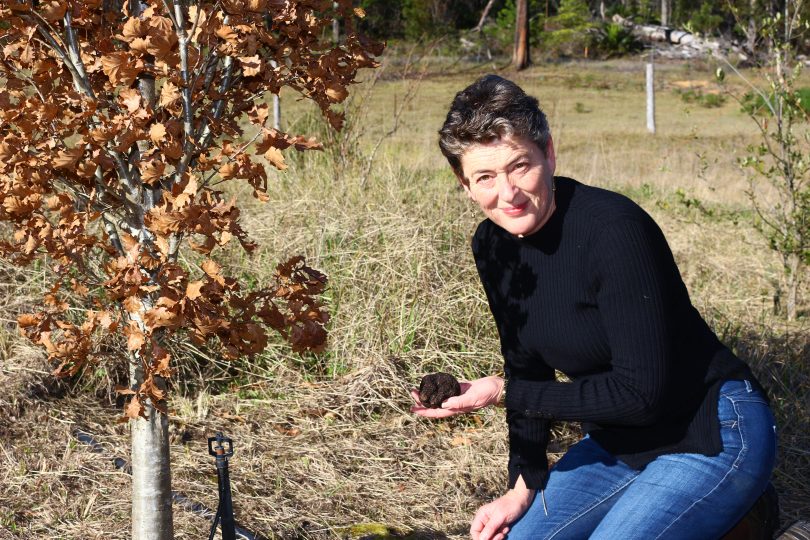
Fiona Kotvojs on her family’s farm at Dignams Creek during a recent truffle harvest. Photo: Supplied.
After a political brawl of epic proportions between John Barilaro and Andrew Constance, the Liberal Party’s Eden-Monaro preselection process has delivered a candidate who says she’s deeply locally grounded but also hard to fit into a box.
Fiona Kotvojs is remarkably diplomatic about the process that finally ended last weekend with a solid victory for her candidacy.
“From my perspective, having a democratic process where members choose who to represent them is key. People got to nominate and stand and the members chose me,” she says.
“Democracy is a messy thing – it’s not nice and neat. We need to value that and the whole process that goes behind it.”
It goes without saying that it’s been a tough year for Eden-Monaro. Already suffering from deep drought, the electorate stretching from Eden to Tumut has been belted by fire and floods, and the region’s tourist economy, in particular, has been hard hit by COVID-19.
Born in Bega, Kotvojs has a long and diverse career that began in teaching, and has encompassed everything from the Army Reserve to preparing environmental impact statements and volunteering for the RFS.
When asked where she sits within the Liberal Party in a factional sense, Kotvojs says she’s not easily categorized.
“I really believe in an old Chinese saying – give a man a fish and feed him for a day, teach him how to fish and feed him for life. That summarises what Liberal philosophy is all about.”
Her ideal is a small government that sets up parameters for people to become independent, aim for their maximum potential and achieve that. She rejects the idea of dependency.
For all that, her language around climate change is precisely chosen, perhaps for a notably diverse electorate. Kotvojs says that she believes “the climate is changing”, and that “humans are contributing to a changing climate”. In response, the focus should be on “reducing emissions, improving adaptation and also the resilience of communities”.
Citing what she says are the lowest level of Australian emissions per head of population in 30 years, Kotvojs has praise for the Snowy 2.0 project but says that approaches to climate change “need to ensure they don’t adversely affect the economy, increase power prices or reduce reliability”. Her own house is off-the-grid and relies on renewables.
Asked directly whether she believes in anthropogenic climate change, Kotvojs says that humans are “a factor” in a changing climate. But, she says, there are other factors and it would be a mistake to deal with one exclusively.
With regard to differing attitudes across that diverse electorate, Region Media also raised a group submission Kotvojs made in support of the Religious Freedom Bill in 2018.
The submission includes, among other statements, that “Parents should have the right to be notified of and then withdraw their children from classes teaching radical LGBTIQ sex and gender theory [and that] religious schools and organisations should be allowed to positively discriminate in employment for people who adhere to their beliefs on marriage”.
“Same-sex marriage is part of legislation and legal. I support the government’s position. I won’t even contest that,” she says today.
Her stance stems from strong beliefs about religious freedom, grounded in family history: Kotvojs’ Jewish grandmother was in Vienna at the time of Kristallnacht and escaped the incoming tide of Nazism. Her father arrived here on his 10th birthday.
“If Australia had not accepted my family, we would not be here,” she says.
But while she believes in the central importance of religious freedom and freedom of speech, saying that “we cannot risk them”, Kotvojs says she is also concerned that views have become polarised, inhibiting respectful conversation across the political spectrum.
“I truly hope that one thing that comes from the fires is that we can work together well. We have seen that in communities across the electorate. One legacy from the bushfires is that we come out of this respectfully.”
Post fires, she wants to assess what needs to fundamentally change, comparing the challenge to looking at the re-fencing she and her husband, Alan Burdon, are undertaking on their property at Dignam’s Creek.
“We need to look to the future and rebuild so we can do it better,” she says. “The greatest thing to work on is better government coordination at all levels.”
She’ll also seek opportunities for young people to remain in their communities and highlights the likelihood that COVID-19 may prompt more sea and tree changers to move into the region. She wants regional communities to be safe, viable destinations for families making that big decision.
And finally, what about her high profile Labor opponent? “Kristy McBain is a nice person and that’s it,” she says. “I believe I am the person who can deliver for Eden Monaro.”












